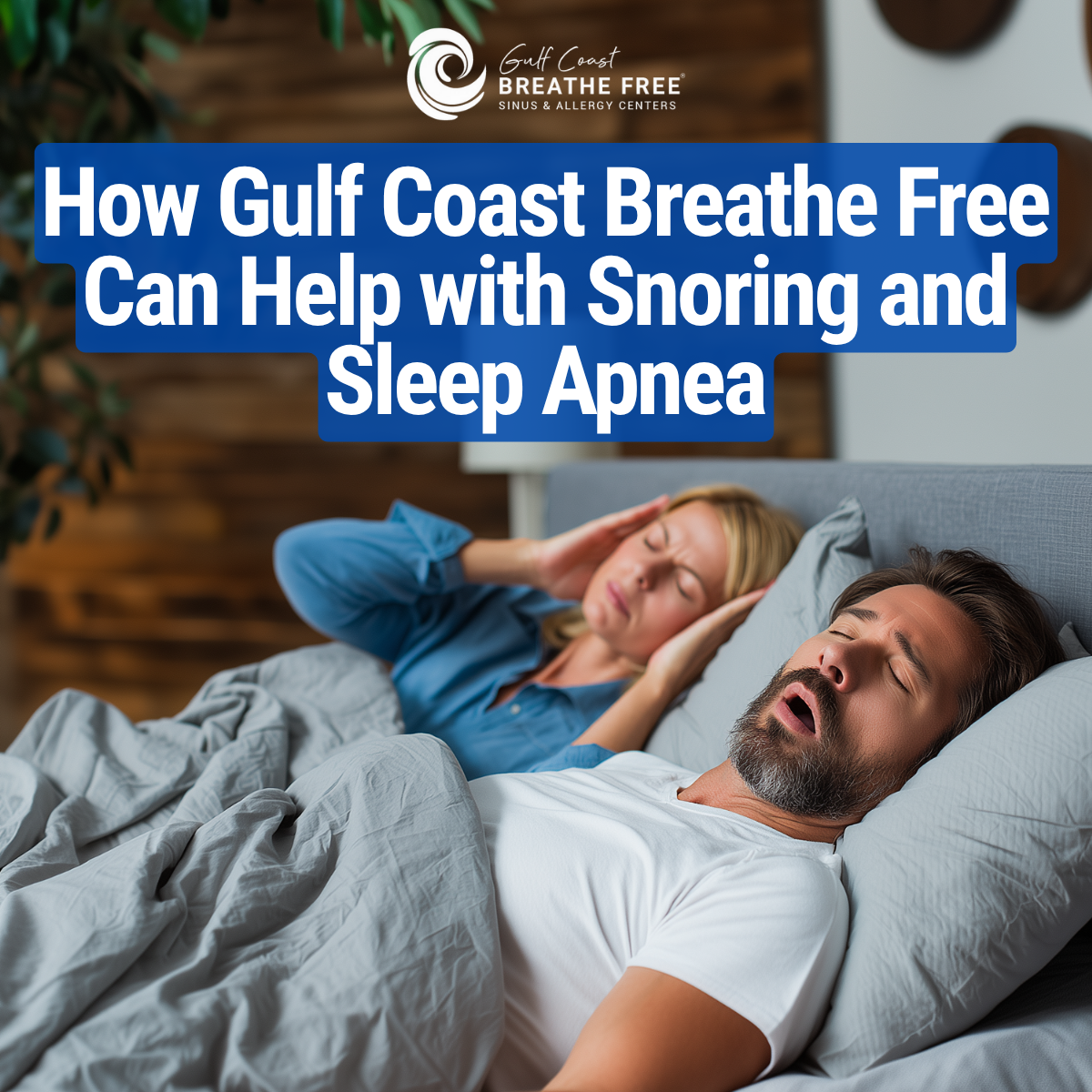How Gulf Coast Breathe Free Can Help with Snoring and Sleep Apnea
Snoring might seem like a harmless nighttime nuisance—but in some cases, it may point to a more serious issue: sleep apnea. If you or someone in your household snores loudly, wakes up tired, or occasionally gasps for air during sleep, it may be time to consider a professional evaluation.
At Gulf Coast Breathe Free, we help patients throughout the Gulf Coast find answers and treatment options that may improve sleep, breathing, and overall quality of life. Whether you're dealing with mild snoring or more persistent signs of sleep apnea, there are care strategies that can help.

Snoring vs. Sleep Apnea: What Gulf Coast Patients Should Know
Snoring occurs when airflow is partially blocked during sleep, causing soft tissues in the throat or nose to vibrate. Occasional snoring is common and typically harmless. However, loud or frequent snoring may signal an underlying condition.
Sleep apnea, on the other hand, is a medical condition where breathing pauses repeatedly during sleep. These interruptions may occur dozens of times per night—often without the individual being aware. Symptoms may include:
- Morning fatigue, even after a full night’s rest
- Headaches upon waking
- Difficulty concentrating during the day
- Mood changes or irritability
- Episodes of choking or gasping during sleep
If these sound familiar, it may be time to talk to a sleep specialist or ENT about sleep apnea evaluation in the Gulf Coast area.
Why It Matters
Sleep apnea isn’t just a nighttime issue—it can affect your long-term health. Left untreated, it may contribute to:
- Elevated blood pressure
- Cardiovascular disease
- Increased risk of stroke
- Type 2 diabetes
- Weight gain or metabolic issues
Disrupted sleep also affects your energy, mood, and productivity. In severe cases, it may lead to daytime drowsiness that interferes with work, driving, and other daily activities.
Snoring and Sleep Apnea Solutions for Gulf Coast Residents
At Gulf Coast Breathe Free, we tailor treatment plans based on your unique symptoms and goals. Our options may include:
1. Lifestyle Modifications
Simple changes—like adjusting sleep position, managing weight, or reducing alcohol consumption before bedtime—can improve mild snoring or obstructive symptoms.
2. Nasal and Sinus Treatment
Chronic nasal blockage can worsen snoring and sleep quality. If allergies, sinus infections, or structural issues (like a deviated septum) are present, we offer solutions to help improve airflow through the nose.
3. Custom Oral Appliances
For patients with mild to moderate sleep apnea, a fitted oral appliance may help keep the airway open during sleep. These devices are often well-tolerated and travel-friendly.
4. Minimally Invasive Procedures
For certain patients, we offer in-office procedures to reduce soft tissue in the airway or enhance sinus drainage. These are performed under local anesthesia and typically require minimal recovery time.
5. Sleep Studies and Diagnosis
If sleep apnea is suspected, we may coordinate a sleep study to confirm the diagnosis and assess severity. Based on the results, we’ll discuss appropriate treatment options with you.
You Don’t Have to Snore Through It
Life on the Gulf Coast should be restful and revitalizing—not disrupted by poor sleep or persistent snoring. If you or a loved one is experiencing symptoms of sleep apnea or struggling with snoring that affects daily life, we’re here to help.
At Gulf Coast Breathe Free Sinus & Allergy Centers, our team combines advanced diagnostics with patient-centered care to guide you toward better rest and breathing.
Better sleep starts with a conversation. Reach out to schedule a consultation and learn more about your options for sleep apnea and snoring treatment in the Gulf Coast region.

.png)